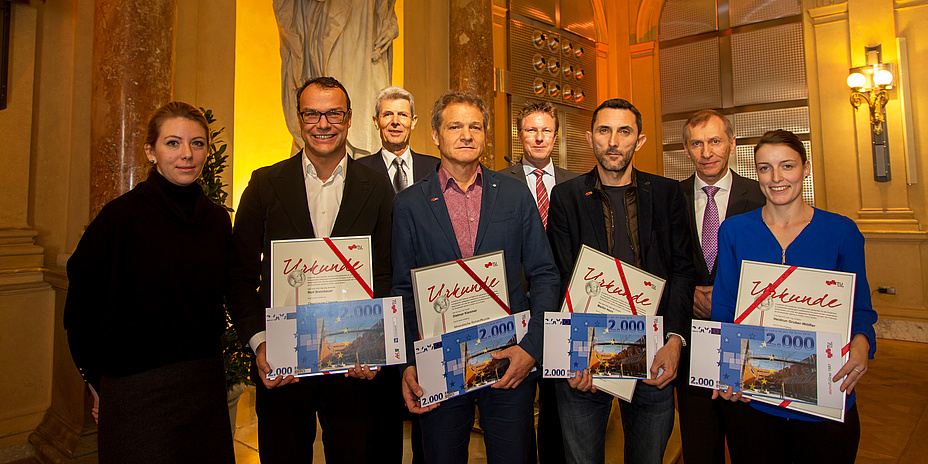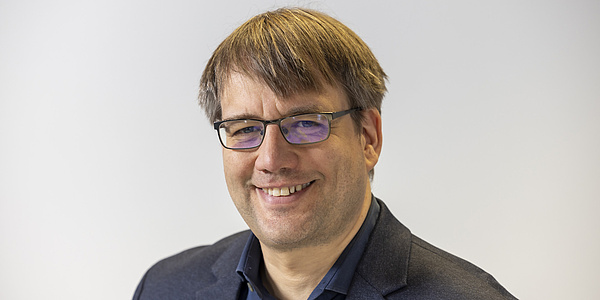24 courses were nominated and four lecturers were honoured with a certificate and prize money of 2,000 euros each. Prizes for Excellence in Teaching 2015/16 went to:
Rolf Breinbauer
“Make demands but be supportive” is the principle according to which Rolf Breinbauer, Institute of Organic Chemistry at Graz University of Technology, lays out his teaching. “My lectures are classical teaching from the board. I write a lot and I don’t write very neatly,” he says with a smirk. But all the lectures are recorded and made available to his students as videos, and can be watched as often as necessary. “In this way students who didn’t come to my class can see all the content,” he explained his intention. What’s more, if they want, his students can fill out exercise sheets, which he corrects, or take part in test exercises or attend his voluntary tutorials. “Above all, I’d like to thank all my students who have taken my courses,” he says, expressing his appreciation.
Rolf Breinbauer was awarded a prize for his course “Organic chemistry”
Martin Horn
“There is no greater feedback for a lecturer than when 200 students sit in a lecture hall, work one-pointedly and ask a lot of questions,” explains Martin Horn from the TU Graz’s Institute of Automation and Control. He supplements his classical teaching from the board with a variety of interactions with students, focuses on exchange and encourages work. He goes into his lectures on principle without any aids and holds a completely extemporaneous talk. “Otherwise you just fall into a rut. In my view, teaching quality suffers from too much routine,” he explains.
Martin Horn was awarded a prize for the courses “Control systems 1”, “Control systems 2” and “Systemtechnik”
Dietmar Klammer
“I’m a passionate mineralogist and try to transmit this enthusiasm. At the same time I’m also a fervent teacher,” says Dietmar Klammer, from TU Graz’s Institute of Applied Geosciences, as he seeks an explanation for his award as a teacher of excellence. “The students notice this and mention it again and again in their evaluations of his teaching.” In his courses he tries to use as little frontal teaching as possible and to teach as interactively as possible. He tries to establish connections between the teaching material and the real world, and often talks in terms of cleaning agents and building site tools. “I’m lucky that mineralogy is a very graphic science,” he explains. “Only in this way can you inspire up to 100 students in a lecture.”
Dietmar Klammer was awarded a prize for the course “Mineral raw materials”.
Heidrun Gruber-Wölfler
Heidrun Gruber-Wölfler from TU Graz’s Institute for Process and Particle Engineering was awarded the prize for “young lecturers”. Because at the moment she’s undergoing a stay abroad in Glasgow, her colleague Bianca Grabner accepted the prize on her behalf. “She doesn’t yet know about it, but I’m going to send her a photo of the certificate,” Grabner says blithely, who herself recently attended the prize lecture series. Today, she supports Gruber-Wölfler in her teaching activities and bases her teaching on blending various teaching methods to integrate students. For instance, “classical modern lectures with PowerPoint presentations” loosened up with group work and examples on the board. Additionally, a regular learning-goal assessment is provided in which students work on exercises in a voluntary way and can examine their learning success.
Heidrun Gruber-Wölfler was awarded a prize for “Pharmaceutical engineering 1: Active ingredients and processes”.
TU Graz recognises teaching achievements
TU Graz awards the Prize for Excellence in Teaching this year for the third time. “Excellence in teaching at universities is the basis for the future success of students. It’s very important for us to recognise the outstanding commitment of our teaching staff,” stressed Detlef Heck, TU Graz’s Vice-Rector for Academic Affairs.
The selection procedure
TU Graz selects the best courses very carefully. The courses nominated by students, deans of study and lecturers themselves have to satisfy various criteria: an excellent concept and excellent implementation, student-orientation, adherence to schedules and organisation count just as much as teaching materials, exam results and the evaluation by students. A selection committee inspects the nominations, and the final decision falls to a seven-member jury made up of representatives of the Students’ Union, University management, members of the Curricular Committee, Senate and external experts in university teaching.
The Styrian Chamber of Labour, the Styrian Federation of Industry, and TU Graz-alumnus Odorich Susani have each endowed a prize.
Gerald GABERSCIK
Dipl.-Ing. Dr.techn.
Quality Management
Phone: +43 (0) 316 873 6019
E-Mail: <link int-link-mail window for sending>gerald.gaberscik@tugraz.at





